It’s a Solemnity!
One of my happiest memories comes from a day in March during Lent in grad school, when I went to a young adult function hungry and tired. I was prepared to drink only water, and eat nothing fun. But as I stepped out of the dark and cold, and entered into the warm light of a not-well-furnished but beautifully old post-grad house, a boisterous friend welcomed me at the door with a glass of wine, and a gesture towards a pack of Oreos, saying, as he raised his glass, “It’s a So-LEM-na-TEE!”
And we all shared in the joy of a respite from dryness.
God is so good. Even in the midst of our hungriest season, He sprinkles two of our greatest solemnities: St. Joseph and the Annunciation.
Today, we are not in Lent. (See, isn’t God good?) But we are in another season of preparation, another season of darkness and light, of coming in from the cold looking for warmth.
Today is the Solemnity of the Immaculate Conception. The day when we celebrate that Mary was purely conceived in Anna’s womb, preparing the way for Christ’s coming.
Five months ago, in mid-July, out of season, something I read in Anthony Esolen’s How the Church Has Changed the World (or maybe it was Brant Pitre’s Jesus and the Jewish Roots of the Eucharist) caused me to ponder the physical impossibility of God entering this world. He is All. He is Transcendence. He is Being. He literally can’t fit into this world, let alone into a room of an Inn, or the womb of a girl. Yet, He does. His transcendence causes Him to be supremely immanent.
And a little poem flowed out.
Before I give you my poem, I’ll give you a better one.
For the last few Advents, I have been deeply enjoying Malcom Guite’s Waiting on the Word, which places before the reader a poem a day (with Guite’s reflections) from the first of December through the Epiphany.
Though I was more than half a year removed from reading John Donne’s Annunciation when I wrote my poem, surely Donne’s words were echoing within me.
“Annunciation”
by John Donne
Salvation to all that will is nigh;
That All, which always is all everywhere,
Which cannot sin, and yet all sins must bear,
Which cannot die, yet cannot choose but die,
Lo! faithful Virgin, yields Himself to lie
In prison, in thy womb; and though He there
Can take no sin, nor thou give, yet He’ll wear,
Taken from thence, flesh, which death’s force may try.
Ere by the spheres time was created thou
Wast in His mind, who is thy Son, and Brother;
Whom thou conceivest, conceived; yea, thou art now
Thy Maker’s maker, and thy Father’s mother,
Thou hast light in dark, and shutt’st in little room
Immensity, cloister’d in thy dear womb,
Stunning.
The immensity of Donne’s reflections couldn’t be contained by the season. And indeed, Guite does an excellent job in his reflections during Advent, on thinking about how Christ’s coming in the stable, brings with it reflections on His entire life. As we welcome the Babe, we can’t help but reflect on the girl who gave birth to Him, as well as on the mother, St. Anne, who conceived the girl, and on the end for which this Boy has come. All times press into this one moment.

All this preamble to say, here’s a little poem for you, reflecting on the Annunciation, the Immaculate Conception, and Christ’s Birth and Death.
“No Room”
by J.C. Risma
No Room for Thy Celestial Size
No Space large enough to Recognize
Immensity of Thee.
Though world be as wide by Three
Ne’er could it once contain the Deity
Who made it It.
Except a heart, nay a close womb,
Thou couldst not dein to entomb
Thyself in me.
In Woman, place, when no place found
A set apart and fertile ground
For Thy Blood’s growth.
No Room, was said to her quite sure
But she to Thee replied demure
Fiat mihi.
In Man, therefore, the Lord took Up
Abode of small Time’s measured Cup
Immanuel.
No Room was truly spoke to Thee
No Room could house Thy ‘Mensity
But she in Thee could shelter Thee
Fiat Mihi.
A merry Advent to you.



